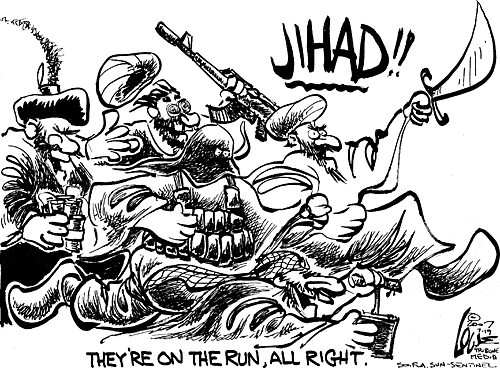BAGHDAD, July 23 — Car bombs ripped through what is normally one of Baghdad's least dangerous neighborhoods on Monday morning, killing at least 12 people and wounding 38. Iraqi authorities said most of the victims were people shopping at busy streetside markets.
The bombs struck Karrada, a largely Shiite neighborhood where rents have increased in the past two years as Iraqis who can afford it have fled there from more dangerous areas of Baghdad.
The attacks appeared coordinated and broke the relative calm that sometimes prevails in the bustling area just across the Tigris River from the Green Zone, seat of the Iraqi government and the American Embassy.
The first bomb exploded in a parked car at 10:30 a.m. "It was like the earth was moving under my feet as an earthquake struck," said Abu Ahmad, 35, a shopowner, who said the bomb sent pieces of glass shooting like shrapnel through his store. "Thanks to God I'm still alive."
The next bomb detonated 15 minutes later in a car parked near a government building that handles identification cards. The bomb tore a large hole in the pavement and scorched nine cars.
Abid Ali Majeed, 75, a shopowner, complained that the killers should never have been allowed so close to a populated area. "I blame the police on patrol nearby," he said. "How could they let the car park in such a place?"
As the violence unfolded in Karrada, residents of Hussainiya, on the outskirts of northern Baghdad, said American forces had imposed a vehicle ban and tightened a cordon that has left them without access to food. Hussainiya, a large Shiite district, has a major presence of Mahdi Army militiamen.
The district has been under siege, residents said, since a bloody skirmish Friday night and Saturday morning in which American aircraft attacked houses and killed as many as 18 people from several families. An Iraqi Interior Ministry official put the death toll at 15. American officials dispute those accounts and say troops used rockets and a bomb to kill six people in buildings where gunmen had taken shelter after firing on American troops.
On Monday, Hussainiya residents who fear that a big battle is looming fled the area, said one resident, Hikmat al-Azzawi, in a telephone interview. Iraqi forces were warning residents to stay inside, he said.
"The Iraqi police are telling people, 'Don't sleep on your roofs for your own safety, to protect yourself from bullets,' " he said. Many Iraqis sleep on roofs in the summer to avoid hotter temperatures in their homes.
Mr. Azzawi said American forces had banned food trucks from Hussainiya but had told residents the trucks could park just outside the district, where residents could walk to them.
A statement from the American military command in Baghdad said Iraqi vendors could take food "south of Hussainiya" and that "civilians are authorized to walk to these vendors to buy food. Donkey carts may be used, but no vehicle movement is authorized. The Coalition is also allowing civilians that need medical aid to walk to the Hamid Shaub Hospital for free treatment."
Four American servicemen were reported killed over the weekend in central Iraq and in Anbar Province, bringing to 57 the number of American troops killed in July, according to Icasualties.org, which tracks American deaths.
The military released few details. It said one marine was killed Saturday in Anbar. Also Saturday, a soldier was killed by a roadside bomb in Baghdad and another, from the 13th Sustainment Command (Expeditionary), died when a bomb exploded near his Humvee south of Samarra. That attack wounded two other soldiers. On Sunday, a soldier from Task Force Marne, which is deployed south of Baghdad, was killed.
Other attacks struck Baghdad on Monday. A car bomb exploded near a popular kebab restaurant close to the Green Zone, killing four people and wounding six. A bomb in central Baghdad killed two people and wounded six.
Two Iraqi guards who worked for the Oil Ministry were killed in a drive-by shooting in Baghdad. And the Iraqi police found 24 corpses around the capital on Monday. Many bore signs of torture or had been shot execution-style.
Near Ramadi, where Sunni tribal leaders have worked with the American military to drive out Sunni extremists and reduce attacks, a male suicide bomber in women's clothes approached an Iraqi police station and asked about a relative who he said had been detained. Then, as his bag was being searched, he blew himself up, killing one policeman and wounding three, the local police said.

